This website uses cookies so that we can provide you with the best user experience possible. Cookie information is stored in your browser and performs functions such as recognising you when you return to our website and helping our team to understand which sections of the website you find most interesting and useful.


President Donald Trump has announced the US will double its current tariff rate on steel and aluminium imports from 25% to 50%, starting on Wednesday.
Speaking at a rally in Pittsburgh, Pennsylvania, Trump said the move would help boost the local steel industry and the national output, while decreasing reliance on China.
Trump also said that $14bn would be invested into the area's steel production through a partnership between US Steel and Japan's Nippon Steel. Details on the partnership are still unclear and both companies have yet to confirm a deal.
The announcement is the latest turn in Trump's rollercoaster approach to tariffs since re-entering office in January.
"There will be no layoffs and no outsourcing whatsoever, and every US steel worker will soon receive a well deserved $5,000 bonus," Trump told the crowd, filled with steelworkers, to raucous applause.
One of the major concerns from steelworkers about the US-Japan trade deal was how Japan would honour workers' union contract which regulates pay and hiring.
Trump began his remarks by reflecting on how he "saved" US Steel, America's biggest steel manufacturer, located in Pittsburgh, with the 25% steel tariffs he implemented during his first term as president, in 2018.
He touted the increase to 50% as a way to ensure US Steel's survival.
"At 50%, they can no longer get over the fence," he said. "We are once again going to put Pennsylvania steel into the backbone of America, like never before."
The announcement comes amid a court battle over the legality over some of Trump's global tariffs, which an appeals court has allowed to continue after a lower court had ordered the administration to halt the taxes.
His tariffs on steel and aluminium were untouched by the lawsuit.
The wide-reaching tariffs have rocked global trade and markets. They have worsened relations between China and the US, the world's two biggest global economies, and launched the countries into a tit-for-tat trade battle.
On Friday, President Trump accused China of violating a truce they'd reached over tariffs earlier this month over talks in Geneva.
China "totally violated its agreement with us," Trump said, though he did not give details. However, US Trade Representative Jamieson Greer later clarified that China had not been removing non-tariff barriers as agreed under the deal.
China then shot back with its own accusations of US wrongdoing. Beijing's response on Friday did not address the US claims directly but urged the US to "cease discriminatory restrictions against China".
China is the world's largest manufacturer of steel, responsible for over half of global steel production, according to World Steel Association statistics from 2022.
The US has slid over the years to the fourth largest steel producer, behind China, India and Japan.
"If you don't have steel, you don't have a country. You don't have a country, you can't make a military. What are we going to do? Say, 'Let's go to China to get our steel from the army tanks," Trump quipped at the Pittsburgh rally on Friday.
Trump's roughly hour-long, wide-ranging rally speech hinted at the deal he said he made with Japan's Nippon Steel but did not offer any new details. Both companies have not yet confirmed any deal was completed.
While campaigning for president, Trump had said he would block foreign acquisition of US Steel, the storied 124-year-old American steel company. It's unclear how the reported partnership would operate and who would own the company.
White House officials said Trump had convinced Japan's Nippon Steel to boost its investment in the US and give the government key say over the operations of the US factories.
According to US media, Japan plans to invest $14bn over 14 months.
Other reported details include that the companies had said they would maintain ownership of US steel in the US, with US citizens on the board and in leadership positions; pledged not to cut production for 10 years; and agreed to give the government the right to veto potential production cuts after that period.



 Africana55 Radio
Africana55 Radio 
